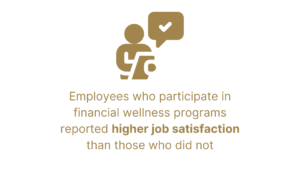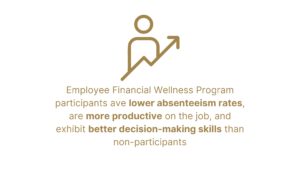Public Sector Employee Financial Wellness Programs: Study Results
Employee Financial wellness is a critical factor in overall well-being, with financial stress being a common concern among employees. A study by PwC revealed that around 59% of employees are stressed about their finances, and that financial stress causes distraction or absenteeism from work. This concern has led to many employers offering employee financial wellness programs as a way to help their employees manage their personal finances and reduce financial stress.

Innovative Public Sector Employee Financial Wellness Programs have emerged as a popular trend in recent years. These programs are tailored to public sector employees and are created to align with the unique needs of this employee demographic. In this article, we will discuss the results of studies that have evaluated the effectiveness and impact of innovative public sector employee financial wellness programs.
Key 4 Features of Public Sector Employee Financial Wellness Programs
Public sector organizations have started offering financial wellness programs to promote employee well-being and organizational success. These programs are designed with a focus on benefits important to public sector employees such as pension, benefit plans, and retirement savings. The programs typically feature multiple components, including:
- Financial education – Knowledge and skill-based tools and resources that provide guidance on financial planning, budgeting, and investing.
- Financial counseling – Individual or group sessions conducted with certified financial planners.
- Financial planning – Active and proactive financial planning services that help employees create a personalized plan of action.
- Retirement planning – Advice and support provided by certified professionals to help employees establish and plan for the retirement goals.
Studies on Employee Financial Wellness Programs
Researchers have studied the effects of employee financial wellness programs on various outcomes such as employee productivity, job satisfaction, and financial behavior. Here are the findings from some of the studies:
1. Higher job satisfaction: The University of Maryland conducted a study to assess financial wellness programs’ impact on employees’ job satisfaction in county government[1]. The study results indicated that employees who participate in financial wellness programs reported higher job satisfaction than those who did not. The report suggests that financial wellness programs can improve employee retention rates and reduce turnover costs.

2. Improved productivity: A study on U.S. Army soldiers evaluated the impact of financial wellness programs on employee productivity[2]. Study findings showed that participants in the program have lower absenteeism rates, are more productive on the job, and exhibit better decision-making skills than non-participants.

3. Positive financial behavior: A study by the Society for Human Resource Management examined the impact of financial wellness programs on employee financial behavior[3]. The study found that employees who participated in financial wellness programs exhibited positive financial behavior, such as an increase in saving rates and a decrease in credit card usage.
4. Positive impact on the employer: Research by the Principal Financial Group suggests that financially well employees are less likely to file claims for medical insurance and disability[4]. This finding highlights that employee financial wellness programs can reduce an employer’s healthcare costs, resulting in increased profits for the company.

The Benefits of Innovative Public Sector Employee Financial Wellness Programs
Implementing employee financial wellness programs can have various benefits for public sector organizations and their employees. Here are some of the advantages:
- Improved Employee Retention: Employees who participate in these programs are more likely to be committed to their job and organization, leading to higher retention rates.
- Reduced Financial Stress: Public sector employees receive specialized financial guidance that promotes their financial stability, allowing them to focus on their work and exhibit increased productivity while reducing financial stress.
- Enhanced Workplace Morale: Programs that prioritize financial wellness promote employee engagement which helps create a positive, productive work environment.
- Positive Return on Investment: Decreased healthcare costs, reduced absenteeism rates, and increased productivity provide ROI to organizations that implement these programs
Improving employee financial wellness has become a priority in today’s workplace, and public sector organizations are taking note. With various innovative financial wellness programs now available for public sector employees, these programs have shown an increase in employees’ financial knowledge, job satisfaction, and productivity. Employers who implement employee financial wellness programs can expect to see a positive return on investment. Given the impressive results, innovative public sector employee financial wellness programs are an excellent way for public sector employees to address the financial stress and build a more stable financial future.
References:
Sources:
- County governments offer financial wellness programs – Paul Coleman, Erin Han, Kathleen Seifert
- Financial Counseling and Planning Journal: Financial education and counseling – an intervention to enhance military life
- Improving Employee Financial Wellness: What’s the Payoff for Employers?
- The Financial Wellness Effect: A Closer Look at the ROI